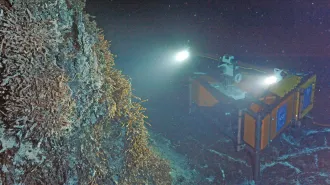
Earth
A long-lost tectonic fragment may be shaking Northern California
Seismic tremors reveal a shallow fragment of an ancient tectonic plate beneath Northern California, helping explain damaging earthquakes near the surface.
Every print subscription comes with full digital access

Seismic tremors reveal a shallow fragment of an ancient tectonic plate beneath Northern California, helping explain damaging earthquakes near the surface.
We summarize the week's scientific breakthroughs every Thursday.

Longest lightning, the first AI-generated genomes and biggest black hole smashup were among this year’s top science superlatives.
New footage shows orcas and dolphins coordinating hunts, hinting at interspecies teamwork to track and catch salmon off British Columbia.

Data from Axial, the most-monitored underwater volcano, are helping geophysicists hone eruption predictions. For Axial, 2026 is their next bet.

When the early Earth’s magma ocean crystallized 4.4 billion years ago, the deep mantle trapped an ocean’s worth of water, scientists say.

Stalagmite data suggest Homo floresiensis faced prolonged drought that stressed both them and their prey, contributing to their disappearance.

A volcanic eruption may have triggered a deadly chain of events that brought the Black Plague to Europe in the 14th century.

Human activity can cause “healed” faults to release their stored strength, triggering unexpected quakes in tectonically stable regions.

As action from the U.N.’s huge COP30 international meeting falls short, smaller groups are banding together to find ways to fight climate change.

Polar marine ecologist Marianne Falardeau investigates how Arctic ecosystems are shifting under climate change.
Subscribers, enter your e-mail address for full access to the Science News archives and digital editions.
Not a subscriber?
Become one now.